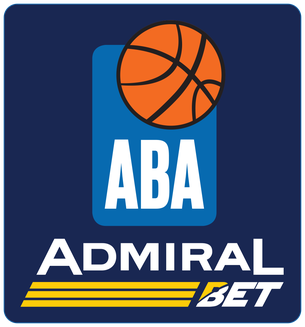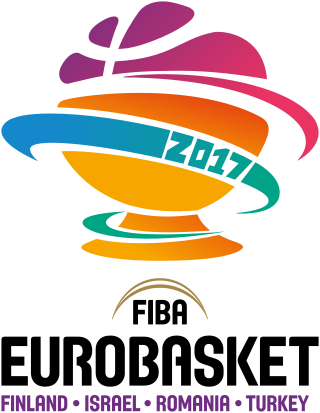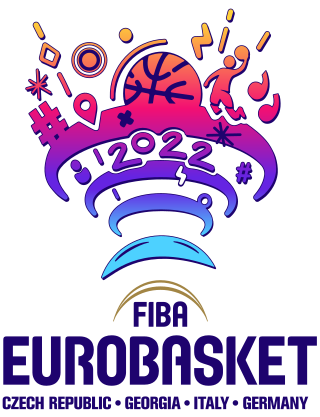
The North Macedonia national football team represents North Macedonia in men's international football, and is administered by the Football Federation of Macedonia. The team play their home matches at the Toše Proeski National Arena in Skopje.

The Serbia men's national football team represents Serbia in men's international football competition. It is controlled by the Football Association of Serbia, the governing body for football in Serbia.

The ABA League, renamed the ABA League First Division in 2017, is the top-tier regional men's professional basketball league that originally featured clubs from former Yugoslavia. Due to sponsorship reasons, the league was also known as the Goodyear League from 2001 to 2006, the NLB League from 2006 to 2011, and as the AdmiralBet ABA League from 2021.

The North Macedonia men's national basketball team represents North Macedonia in international basketball and is controlled by the Basketball Federation of North Macedonia. They joined FIBA in 1993, after they gained independence from Yugoslavia. That same year the national team played their first official match against Estonia. Prior to 1993, Macedonian players took part on the Yugoslavia national team.

The Czech Republic men's national basketball team, recognised by FIBA as Czechia, represents the Czech Republic in international basketball. The team is controlled by the Czech Basketball Federation (ČBF).

Arijan Ademi is a professional footballer who plays for Croatian Football League club Dinamo Zagreb.

EuroBasket 2015 was the 39th edition of the EuroBasket championship that was organized by FIBA Europe. It was co-hosted by Croatia, France, Germany, and Latvia, making it the first EuroBasket held in more than one country. It started on 5 September and ended on 20 September 2015.

EuroBasket 2017 was the 40th edition of the EuroBasket championship that was organized by FIBA Europe and held between 31 August and 17 September 2017. Beginning from 2017, the continental championships take place every four years with a similar system of qualification as for the FIBA Basketball World Cup.
The UEFA European Championship is one of the major competitive international football tournaments, first played in 1960, whose finals stage has been held every four years.

The 2018 EHF European Men's Handball Championship was the 14th edition of the tournament, hosted for the second time in Croatia from 12 to 28 January 2018. Croatia was awarded hosting the tournament during the EHF congress in Dublin on 20 September 2014. This was the last edition to feature 16 teams, with the 2020 edition expanding to 24 teams and six preliminary groups format.
This page describes the qualification procedure for EuroBasket Women 2017.

The EuroBasket 2022 was the 41st edition of the EuroBasket championship organized by FIBA Europe. It was the first since it was agreed it would take place every four years, with a similar system of qualification as for the FIBA Basketball World Cup. It was originally scheduled to take place between 2 and 19 September 2021, but due to the COVID-19 pandemic and the subsequent postponement of the 2020 Summer Olympics to 2021, it was postponed to September 2022.
The 2019 FIBA Basketball World Cupqualification for the FIBA Europe region, began in August 2017 and concluded in February 2019. Contrary to previous years, no teams were automatically placed into the World Cup, so all FIBA Europe nations had to participate in qualification.
This page describes the qualification procedure for EuroBasket Women 2019.

The EuroBasket 2022 qualification was a basketball competition that was played from November 2017 to February 2021, to determine the 20 FIBA Europe nations who would join the automatically qualified co-hosts Czech Republic, Georgia, Italy, and Germany at the EuroBasket 2022 finals tournament.
This page describes the qualification procedure for FIBA Women's EuroBasket 2021. 14 teams joined the co-hosts France and Spain.
The EuroBasket Women 2023 qualification was held from November 2021 to February 2023 to decide the 14 teams to join the co-hosts Israel and Slovenia. It featured 38 teams split in ten groups of three or four teams. The ten group winners and the four best second-ranked teams qualified for the final tournament.

The EuroBasket 2025 qualification is a basketball competition that is being played from November 2021 to February 2025, to determine the 20 FIBA Europe member nations who will join the automatically qualified co-hosts Cyprus, Finland, Poland and Latvia at the EuroBasket 2025 finals tournament.
The article describes the European qualifiers for the 2023 FIBA Basketball World Cup.

The EuroBasket Women 2025 qualification is held from November 2023 to February 2025 to decide the 12 teams to join the co-hosts Czech Republic, Germany, Greece and Italy. It features 36 teams split in eight groups of four teams. The eight group winners and the four best second-ranked teams qualify for the final tournament. The four co-hosts are placed in the same group.












